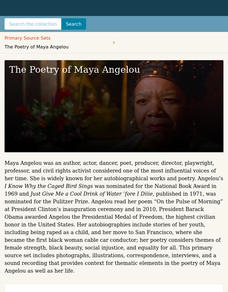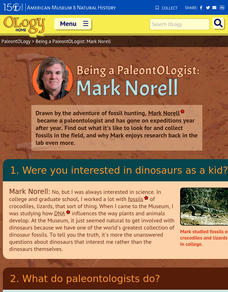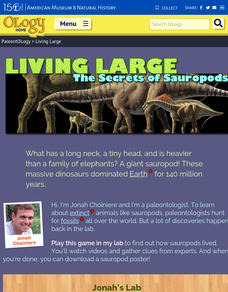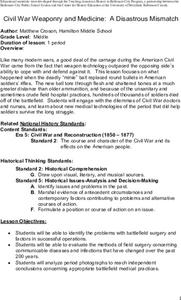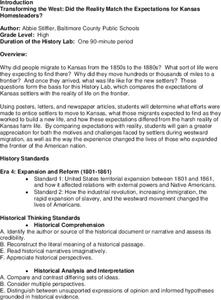DocsTeach
The Civil War: Commemorate or Celebrate?
While the Civil War ended over 150 years ago, Americans are still unsure how it should be remembered. Is the tragic conflict to be celebrated for bringing freedom to African Americans or commemorated for its sad place in US history?...
Digital Public Library of America
The Poetry of Maya Angelou
Maya Angelou's work reflects her passion for life, civil rights, and justice for all. A collection of 12 primary sources provide scholars with insight into this amazing woman. The set includes photographs, articles, recordings of...
Digital Public Library of America
The Watsons Go To Birmingham—1963 by Christopher Paul Curtis
A primary source set of photographs, videos, newspaper articles, and FBI reports provides insight into race relations during the 1960s, the Sixteenth Street Baptist Church bombing, and the murder of Emmitt Till. Designed to be used to...
Digital Public Library of America
Ida B. Wells and Anti-Lynching Activism
A packet of 13 primary sources provides young historians with insight into the anti-lynching activism of civil rights Ida B. Wells. Included are images of Wells, her letters, a political cartoon, newspaper lynching announcements, and a...
National Woman's History Museum
Red Power Prevails : The Activism, Spirit, and Resistance of Native American Women
Native American women powered the American Indian Movement and other social changes, but they are often forgotten by history books. Examining a series of resources, including a documentary film, photographs, secondary sources, and social...
Digital Public Library of America
Their Eyes Were Watching God by Zora Neale Hurston
Zora Neale Hurston's novel Their eyes Were Watching God has been highly praised and severely criticized for its depiction of African American folk culture. A set of primary source materials, including photographs, articles, essays, and...
British Heart Foundation
Women in Science: A Timeline
Scroll down an engaging webpage to discover a plethora of women whose contributions shaped the science world from 1865 to today. Science enthusiasts follow a red guideline to read brief blurbs, watch videos, and examine photographs.
American Museum of Natural History
Being a Paleontologist: Mark Norell
Get to know paleontologist Mark Norell with a 19 question interview. Written questions, answers, and photographs with descriptions sit among bright and cheery graphics
DocsTeach
Nixon Visits China: The Week that Changed the World
Sometimes one trip shakes up the entire world. When President Richard Nixon traveled to China, he defied international and political boundaries. Nixon was the first American president to visit mainland China, which was a communist nation...
Academy of American Poets
The Immigrant Experience
The Buttonhook by Mary Jo Salter is the focus of a unit that explores the immigration experience to Ellis Island. First, scholars bring in an artifact that represents their heritage. A group-exercise allows them to share and discuss...
DocsTeach
Landing a Man on the Moon: President Nixon and the Apollo Program
Take the small step for man and giant leap for mankind with the Apollo astronauts using primary sources. Young historians explore the documents related to the American space program up through the lunar landing, including presidential...
DocsTeach
Analyzing Photographs of the Triangle Shirtwaist Factory Fire
While a catalyst for the labor movement, 146 people lost their lives in the Triangle Shirtwaist Factory Fire in 1913. A series of photographs of the aftermath of the tragedy help young historians consider the impact of the fire. The...
Smithsonian Institution
Separate is Not Equal: Fight for Desegregation
Separate is not equal! An eye-opening lesson delves into the past to understand the fight for desegregation and how it impacted African American communities. Academics complete two one-hour lessons using documents, photographs, and...
American Museum of Natural History
Living Large
Get to know all about sauropods from a paleontologist, Jonah. Following an introductory video, scholars choose from five fossils to learn more about. Each fossil begins with a video, provides information from several different...
EngageNY
Determining Author’s Opinions, Reasons, and Evidence: Signs of Hope and Progress for African Americans in the 1920s (Promises to Keep, Pages 14–15)
Caption this. Readers look at the text features in Promises to Keep and pay special attention to the photographs and captions before adding to the Features of Informational Text anchor chart. Learners then answer questions about life in...
EngageNY
Developing an Opinion Based on the Textual Evidence: Jackie Robinson’s Role in the Civil Rights Movement (Promises to Keep, Pages 50–57)
Caption this. Scholars look at pages 50-57 of Promises to Keep and discuss the photographs on the pages. They analyze the captions with the pictures and then discuss vocabulary such as human rights and civil rights.
Center for History Education
Civil War Weaponry and Medicine: A Disastrous Mismatch
Ironically, science was the reason why the Civil War was so deadly. Despite the use of medical practices now considered barbaric—such as conducting surgery with bare, dirty hands—developments in weaponry meant that more men died on and...
Center for History Education
The Federal Theatre Project: Analyzing Conflict Among Relief, Art, and Politics in 1930s America
In the effort to soothe the suffering of the Great Depression, New Deal programs funded a variety of approaches - including a theater project that proved controversial! Using documents such as oral histories, as well as photographs of...
Center for History Education
Continuity or Change? African Americans in World War II
While World War II was a pivotal moment in history, historians debate its importance to the civil rights movement. Class members consider the implications of segregation and the war using a series of documents and a jigsaw activity....
DocsTeach
Cultural Diplomacy and the Smith-Mundt Act
During the Cold War, the United States used everything from bookmobiles to radio stations to improve its image globally. Using documents from the programs, including photographs and official memos, individuals consider how the United...
Center for History Education
Transforming the West: Did the Reality Match the Expectations for Kansas Homesteaders?
They expected good soil and hearty crops ... but they found buffalo chips and grasshopper plagues. Using an advertisement encouraging famers to go west, budding historians examine primary sources including letters, photographs, and...
Newseum
Photo Ethics: Diversity
With the advent of photo manipulation software, it is possible to digitally edit a photograph in a way that is virtually undetectable. The question asked of young journalists in this lesson is whether such manipulation is ethical. Groups...
Newseum
Compare Coverage of Brown v. Board Ruling
Young journalists analyze how The Topeka State Journal, the Jackson Daily News, and The Providence Journal reported on the 1954 Supreme Court decision in Brown v Board of Education. Scholars scrutinize the headlines, photographs,...
DocsTeach
Ernest Hemingway: Life and Works
An interactive activity asks scholars to match the title of an Ernest Hemingway novel with one of seven photographs.
Other popular searches
- Photography
- Digital Photography
- Photography History
- Digital Camera
- Black and White Photography
- Portrait Photography
- Food Photography
- Photography Lesson Plans
- Digital Pictures
- Creative Project Photography
- Life Photography
- Photography Camera



